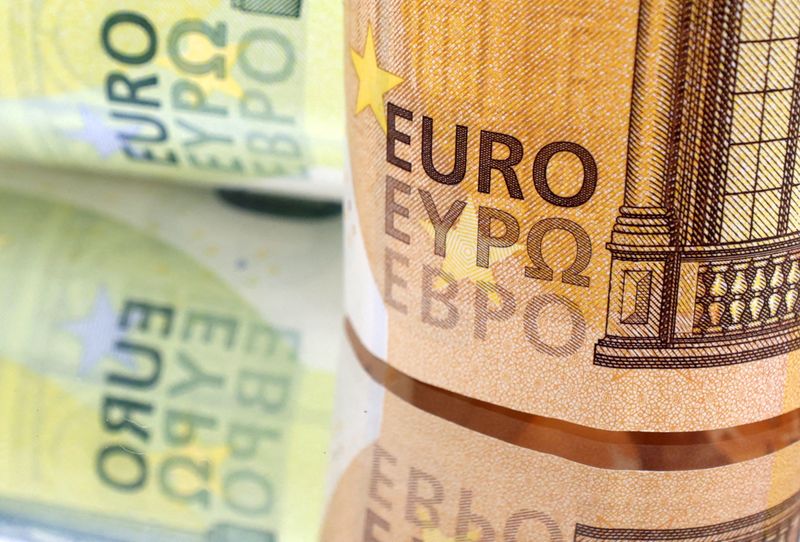By Naomi Rovnick and Dhara Ranasinghe
LONDON (Reuters) – Euro bulls are set for an anxious summer ahead as doubts creep in over how far the ostensibly still-hawkish European Central Bank will go with interest rate rises.
The euro has been on a stellar run, up roughly 3.5% against the dollar so far this year to just under $1.11. Measured against the currencies of the euro zone’s main trading partners, it is not far off this month’s record highs.
Investors are strongly positioned for the euro – which languished at two-decade lows against the greenback this time last year – to keep rising.
That view is primarily based on the belief that the U.S. Federal Reserve will end its most energetic rate rise cycle in 40 years before the ECB turns dovish.
Under the surface, investors and economists say, even the most hawkish ECB members will be looking for the end of tightening as inflation softens and economic activity weakens.
“I don’t have a high conviction on the euro,” said Gabriele Foa, co-portfolio manager at Algebris Investments, who said he had been bullish on the single currency at the start of 2023 while now maintaining a mild “long bias”.
The ECB, he added, would “keep the inflation-fighting mask on” for a few more months, while at the same time weak data would be “feeding into (ECB) communication and eventually policy”.
On Thursday, the ECB delivered a widely anticipated 25 basis points rate increase to a 23-year high of 3.75% and said inflation remained too high.
ECB President Christine Lagarde responded to most of the questions at a press conference by saying all options remained on the table to “break the back” of inflation, but sent the euro tumbling with a dovish flourish near the end.
“Do we have more ground to cover? At this point in time I wouldn’t say so,” Lagarde said, almost unprompted, stressing that the ECB’s decisions would depend on incoming data.
The euro fell 0.9% against the dollar, with stubborn inflation and a growing risk of a recession pulling policymakers in opposing directions.
The Federal Reserve on Wednesday also hiked interest rates but markets suspect that was its last tightening move. In contrast, money markets now price in a 40% chance of another quarter point ECB move in September.
BOUNCE BACK
A hawkish ECB, just as cooling U.S. inflation points to peak Fed rates, helps explain the euro’s recent rally. The currency is up roughly 10% from lows hit last year below the psychologically key $1-mark.
A trade-weighted index, that measures the euro’s value against a basket of other currencies and is followed closely by the ECB, is trading near record highs.
That is partly because of weakness in the yuan, which accounts for over 10% of the basket, and has been hurt by a lacklustre Chinese economy.
Speculators had the biggest net long position in the euro in nine weeks in the week ended July 18, CFTC data showed.
The path ahead was expected to be foggy over the summer as the market awaits new ECB inflation projections in September, fresh data, and assesses the Fed outlook. July euro zone inflation numbers are out next week.
“I’m a little sceptical of markets thinking that they (ECB policymakers) will twist at this point into a more dovish position,” said Francesco Sandrini, head of multi-asset strategies at Amundi, Europe’s largest asset manager.
“This is going to happen but only when inflation peaks … we’ll probably embark on a reversal like we are seeing already underway in the U.S., but that’s not a moment yet.”
Sandrini said Amundi expected the euro to rise to $1.15- $1.20 in the coming quarters, implying a further gain of at least 4% from current levels.
Further euro gains were not expected to unsettle policymakers since this would help keep the costs of imports – and overall inflation – down.
“Currency strength is welcome to battle inflation, it’s why the SNB for example does not mind about the franc,” said Societe General currency strategist Kenneth Broux. He was referring to the Swiss National Bank and a Swiss franc up over 7% against the dollar so far in 2023.
But with the jury very much out on whether the ECB will move again in September, the currency could as easily head down as back up, analysts said.
Monex Europe head of FX analysis Simon Harvey reckons, “the data will push back against the idea they can hike again in September”.
Euro zone business showed shrank much more than expected in July as demand in the bloc’s dominant services industry declined, data this week showed.
A euro level of $1.10, Harvey said, seemed fair.
Some were bearish.
Robin Brooks, chief economist at the Institute for International Finance in Washington, said a war in Ukraine that had left energy prices highly elevated pointed to a big terms of shock trade that should pull the euro back down.
“I don’t think the rally back from parity should have happened,” Brooks said.
(Reporting by Naomi Rovnick and Dhara Ranasinghe, Editing by Catherine Evans)
